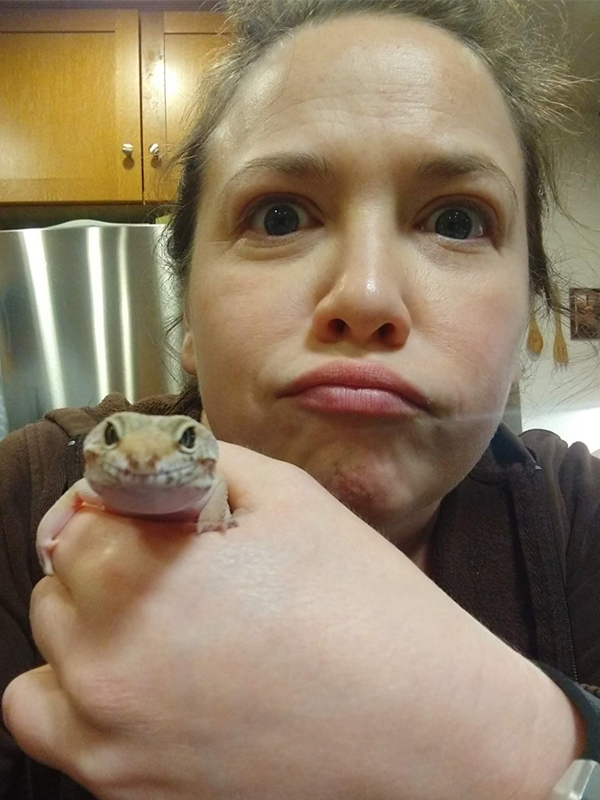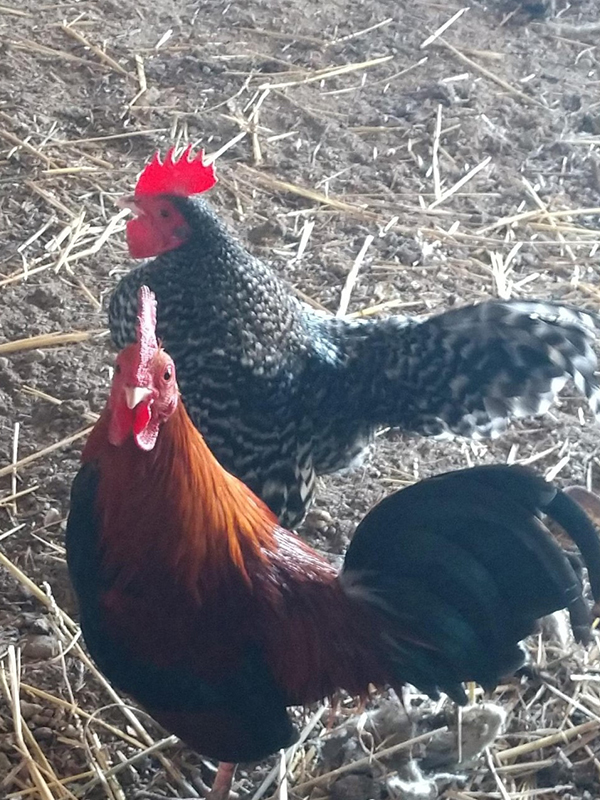Wild, wild life
Animal Crossing is a popular video game series where the player creates a village and invites any number of anthropomorphic critters to settle in an idyllic hamlet where days consist of little more than collecting fruit for sale, fishing, fossil-hunting, watering flowers, and watching fireworks shows.
It’s a relaxing virtual trip to a town where turnips are a top commodity and a top-hatted tortoise holds the highest elected office.
At no point is the player ever chased by a hungry 200-pound pig with a hankering for pumpkin pies, however; and in that regard, real life – for DeAnna Poon at least – will always be infinitely more interesting.

Indiana Utility Regulatory Commission assistant general counsel DeAnna Poon has volunteered for a Plainfield animal rescue for the last three years. She’s pictured here with a gecko.
Wild world
The pig incident was one of the more humorous – if not harrowing – experiences Poon, assistant general counsel with the Indiana Utility Regulatory Commission, can recall throughout three years of volunteering at an animal rescue.
The Plainfield-based A Critter’s Chance specializes in rescuing and rehabilitating domestic as well as exotic animals. The nonprofit assists animal shelters and rescues that are unable to care for exotic animals, helps with pet adoptions, and even works with government officials to enhance and improve laws related to animal abuse and neglect. Though it’s based in Indiana, A Critter’s Chance provides services throughout the country.
That work was a natural fit for DeAnna who, in addition to fostering, has been part of bunny yoga – which certainly sounds like something from Animal Crossing, but is really just “ordinary” yoga.
But with rabbits.
“I’ve always loved animals and volunteering,” said Poon. “I tell people I went from pen to pitchfork.”
DeAnna said a colleague invited her to A Critter’s Chance and that led her to begin fostering animals on her own. She has continued volunteering at the rescue and that experience, while often far from glamorous, provided tales such as the previously mentioned “hangry” hog incident.
“We happened to have these little pumpkin pies the day the pig escaped [her enclosure],” said Poon. “I used one to lure her back to her pen, so I’m running as fast as I can because a 200-pound pig is very pie-motivated and surprisingly fast.”
Poon explained that the tasty snacks were donated to the animal rescue by a food pantry, which is common when some of the goods pass their sell-by date. But clearly, the pig didn’t care about the pumpkin pies’ origins as it chased DeAnna back toward its pen.
“I’m trying not to slip and fall and thinking, ‘Please, don’t let this be the way I die -- trampled or eaten by a snacky pig,’” Poon recalled, fully aware of the hilarity of the story.
Animal farm
At home, things are a bit more serene.
DeAnna, a married mother of one, is a human mom to two dogs, four Pekin ducks, and a chicken. Her daughter also has a trio of rats. Husband Peter works as an electrical engineer for the Indiana Department of Environmental Management’s Office of Water Quality/Drinking Water Branch.
The Poon family’s chicken – “Betsy” to those to whom she’s acquainted – is a hoot of a hen that DeAnna calls her favorite of the family’s flock.
“She is so funny,” said Poon. “She will come when you call and she loves treats. We let her into our garage and she will hunt around for bugs to eat. She keeps the window sills very tidy.”
Betsy is clearly quite a chicken, but DeAnna cautions that keeping such pets is a big responsibility. To that end, she recently conducted video programs during the Indiana State Employees’ Community Campaign (SECC) to answer questions about caring for exotic pets and to showcase how these rewarding relationships require unwavering commitment.
The family’s ducks are a prime example.
“If you want to keep ducks and chickens, you have to be very mindful that they are domesticated prey animals,” she explained. “That means they are not meant to be wild and ‘releasing’ them into the wild is a death sentence.”
The birds’ coops must be secure so as to deter predators, and an adequate food and water supply is a must. Beyond that, be prepared for fowl that might not rate highly with Animal Crossing’s “Happy Room Academy.”
“While ducks are very cute, they are also very gross,” DeAnna said. “They need an area to swim and they get mud everywhere.”
Much to consider
While children are undoubtedly bound to be big fans of animals of the barnyard and beyond, they are unlikely to be good caretakers of pets – especially those that require more diligence.
“For parents, whatever expectations you have about your child’s ability to care for an animal, lower it substantially,” the attorney said. “Younger children frequently don’t have the motor skills or understanding of how to properly pick up an animal, pet it, or remember to provide it with food and water.”
As is the case with the family cat or dog, the joy of raising a pet is immense, but respect for the animal’s nature and its needs will go a long way in providing it the pleasant life it deserves.
The cost involved is another factor that must be considered. Many veterinarians who care for more typical pets, such as cats and dogs, don’t offer similar services for exotic animals; and finding a proper vet can be a bigger expense than some might imagine.
This is the type of knowledge DeAnna shared last fall during her SECC video presentations, which were well received.
“I did receive a lot of great feedback,” she said. “People found it helpful to know the detailed care that goes into exotic and farm animals.”
A lost art
Appropriately enough, Poon’s SECC presentations were intended to raise money for A Critter’s Chance. And while caring for exotic pets – like a lamb… or an emu – may not be for everyone, another of DeAnna’s hobbies and talents could be appealing to just about anybody.
“My grandmother canned food and it is a lost art,” said Poon who is also an avid food preservationist. “When I tell people that I can, many of them perk up and tell me their mother or grandmother used to do it,” she continued. “I started helping my mom when I was little. I started doing it again as an adult. I like it because I know exactly what is going into my food, it’s made for my taste, and I’m in charge of the quality control.”
There’s a technique to it, of course, and DeAnna shared advice on this time-tested practice during her SECC video series as well.
Your grandmother definitely was onto something when she meticulously sealed up those green beans and tomatoes for future rainy days, however, and Poon believes there are quite a few advantages to at-home canning in spite of how modern life has relegated the practice to the back of the proverbial kitchen cupboard.
“Canning is beneficial if you have a large garden and won’t be able to eat all the food before it spoils,” she said. “It’s also great for people who don’t have a lot of fridge or freezer space but want to keep a large amount of food available. Finally, once you have all the supplies, it is very cost effective. Jars of pasta sauce, pizza sauce, and salsa cost me around $2 per jar.”

DeAnna Poon recently conducted a video series where she gave advice on how to care for exotic pets, such as the chickens seen here, as well as how to preserve veggies and other food.
Living wild, wild life
A lifelong Hoosier, DeAnna Poon began her career with the state of Indiana as an intern in 2003. A year later, she started as a full-time employee. These days, she’s more than happy to share her advice on canning and caring for critters, and she does it all with a wry sense of humor.
After all, with exotic animals, it’s probably best to expect the unexpected. It’s a bit of a dirty job, to be sure, but someone’s gotta do it and DeAnna wouldn’t have it any other way. Just be prepared to clean up a mess.
“Pretty much all the rest of my funny stories involve poop,” she said facetiously. “So. Much. Poop.”
All in a day’s (chicken coop-cleaning) work, we suppose.
Heavens to Betsy.
Story by Brent Brown, Indiana State Personnel Department
Photos provided by DeAnna Poon, Indiana Utility Regulatory Commission